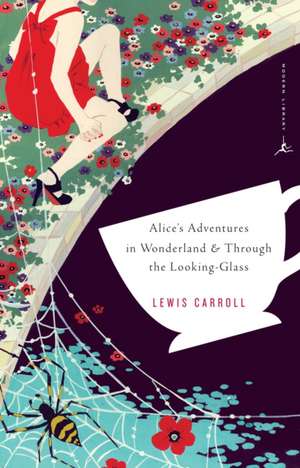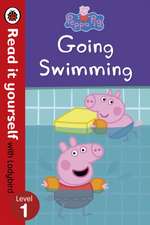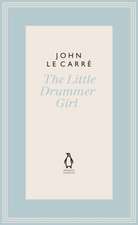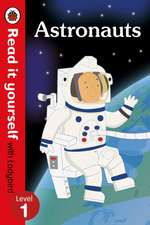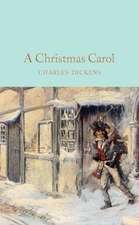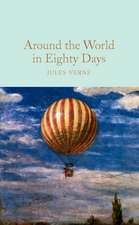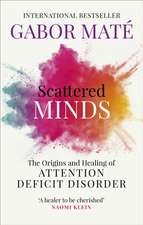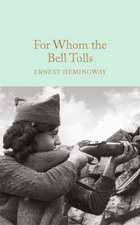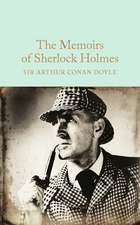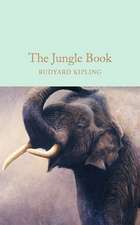Alice's Adventures in Wonderland & Through the Looking-Glass: Modern Library Classics
Autor Lewis Carrollen Limba Engleză Paperback – 26 dec 2002
| Toate formatele și edițiile | Preț | Express |
|---|---|---|
| Hardback (3) | 42.67 lei 3-5 săpt. | +27.68 lei 7-13 zile |
| Pan Macmillan – 30 iun 2016 | 42.67 lei 3-5 săpt. | +27.68 lei 7-13 zile |
| Pan Macmillan – 13 iul 2016 | 52.35 lei 3-5 săpt. | +35.15 lei 7-13 zile |
| Dover Publications Inc. – 24 oct 2024 | 112.41 lei 3-5 săpt. | +36.03 lei 7-13 zile |
Din seria Modern Library Classics
-
 Preț: 55.06 lei
Preț: 55.06 lei -
 Preț: 105.38 lei
Preț: 105.38 lei -
 Preț: 121.89 lei
Preț: 121.89 lei -
 Preț: 92.61 lei
Preț: 92.61 lei -
 Preț: 83.71 lei
Preț: 83.71 lei -
 Preț: 110.15 lei
Preț: 110.15 lei -
 Preț: 133.82 lei
Preț: 133.82 lei -
 Preț: 137.55 lei
Preț: 137.55 lei -
 Preț: 60.41 lei
Preț: 60.41 lei -
 Preț: 84.57 lei
Preț: 84.57 lei - 21%
 Preț: 87.90 lei
Preț: 87.90 lei - 12%
 Preț: 101.98 lei
Preț: 101.98 lei -
 Preț: 107.67 lei
Preț: 107.67 lei -
 Preț: 43.39 lei
Preț: 43.39 lei - 23%
 Preț: 80.59 lei
Preț: 80.59 lei -
 Preț: 66.70 lei
Preț: 66.70 lei -
 Preț: 110.95 lei
Preț: 110.95 lei -
 Preț: 129.50 lei
Preț: 129.50 lei -
 Preț: 191.61 lei
Preț: 191.61 lei -
 Preț: 152.40 lei
Preț: 152.40 lei -
 Preț: 84.58 lei
Preț: 84.58 lei -
 Preț: 121.44 lei
Preț: 121.44 lei -
 Preț: 55.86 lei
Preț: 55.86 lei -
 Preț: 83.53 lei
Preț: 83.53 lei -
 Preț: 119.81 lei
Preț: 119.81 lei -
 Preț: 108.87 lei
Preț: 108.87 lei - 8%
 Preț: 48.16 lei
Preț: 48.16 lei - 23%
 Preț: 79.25 lei
Preț: 79.25 lei -
 Preț: 124.77 lei
Preț: 124.77 lei -
 Preț: 97.19 lei
Preț: 97.19 lei -
 Preț: 122.28 lei
Preț: 122.28 lei -
 Preț: 103.31 lei
Preț: 103.31 lei - 7%
 Preț: 92.18 lei
Preț: 92.18 lei -
 Preț: 108.68 lei
Preț: 108.68 lei -
 Preț: 84.75 lei
Preț: 84.75 lei -
 Preț: 109.11 lei
Preț: 109.11 lei -
 Preț: 91.69 lei
Preț: 91.69 lei -
 Preț: 107.66 lei
Preț: 107.66 lei -
 Preț: 126.20 lei
Preț: 126.20 lei -
 Preț: 130.35 lei
Preț: 130.35 lei -
 Preț: 114.24 lei
Preț: 114.24 lei -
 Preț: 142.52 lei
Preț: 142.52 lei - 10%
 Preț: 56.64 lei
Preț: 56.64 lei -
 Preț: 101.45 lei
Preț: 101.45 lei -
 Preț: 101.90 lei
Preț: 101.90 lei -
 Preț: 89.72 lei
Preț: 89.72 lei -
 Preț: 94.62 lei
Preț: 94.62 lei -
 Preț: 106.90 lei
Preț: 106.90 lei - 8%
 Preț: 79.33 lei
Preț: 79.33 lei -
 Preț: 133.43 lei
Preț: 133.43 lei
Preț: 53.84 lei
Preț vechi: 63.83 lei
-16% Nou
10.30€ • 10.76$ • 8.53£
Disponibilitate incertă
Specificații
ISBN-10: 0375761381
Pagini: 304
Ilustrații: illustrations
Dimensiuni: 133 x 204 x 17 mm
Greutate: 0.25 kg
Ediția:Revised
Editura: KUPERARD (BRAVO LTD)
Seria Modern Library Classics
Notă biografică
"Lewis Carroll," creator of the brilliantly witty Alice's Adventures in Wonderland, was a pseudonym for Charles Lutwidge Dodgson, a shy Oxford don with a stammer.
He was born at Daresbury, Cheshire on January 27, 1832, son of a vicar. As the eldest boy among eleven children, he learned early to amuse his siblings by writing and editing family magazines. He was educated at Christ Church College, Oxford, where he lectured in mathematics from1855 to 1881. In 1861 he was ordained as a deacon. Dodgson's entry into the world of fiction was accidental. It happened one "golden afternoon" as he escorted his colleague's three daughters on a trip up the river Isis. There he invented the story that might have been forgotten if not for the persistence of the youngest girl, Alice Liddell. Thanks to her, and to her encouraging friends, Alice was published in 1865, with drawings by the political cartoonist, John Tenniel. After Alice, Dodgson wrote Phantasmagoria and Other Poems (1869), Through the Looking-Glass (1871), The Hunting of Shark (1876, and Rhyme? and Reason? (1883). As a mathematician Dodgson is best known for Euclid and His Modern Rivals (1879). He was also a superb children's photographer, who captured the delicate, sensuous beauty of such little girls as Alice Liddell and Ellen Terry, the future actress. W.H. Auden called him "one of the best portrait photographer of the century." Dodgson was also an inventor; his projects included a game of arithmetic croquet, a substitute for glue, and an apparatus for making notes in the dark. Though he sought publication for his light verse, he never dreamed his true gift-telling stories to children-merited publication or lasting fame, and he avoided publicity scrupulously Charles Dodgson died in 1898 of influenza.Descriere
Charles Lutwidge Dodgson (alias Lewis Carroll) was an interesting and idiosyncratic character, to say the least. He was a mathematics lecturer at Cambridge University and a deacon in the Anglican Church. Obviously a very bright man he suffered from physical impairments such as partial deafness and a stammer which, perhaps, made him reserved and slightly aloof from the society of the day. He also had a predilection for young female companionship, which would seem highly contentious to us today but was, perhaps, more acceptable (and possibly entirely innocent) in the latter part of the 19th century. The books can be read on a number of levels. They originally emerged from a boat trip that Dodgson took with a family he knew (the Liddells) including their three daughters and he told them a tale to while away the journey. The children were so taken with it that they asked him to write it down - and so the legend began. It is quite possible that, initially, Dodgson has simply intended the tale to be a children's story for their amusement; but when he set about writing it down, expanding and structuring it he introduced some darker, perhaps even sinister elements to the tale. His penchant for logic, dry humour and nonsense pervades the stories but there is also a suggestion of themes running through the books. Inevitably the states of childhood and maturity feature strongly given Dodgson's own situation and the nature of his relationships with both adults and children. The topsyturvy nature of Wonderland could be seen as a commentary on the outside world where the child, Alice, seems to be the only sane and sensible person around. Dodgson himself seemed to live more in a child's world than adults. The nature of his occupations - in academia, the church and finally writing - would all serve to contain him in an unreal existence, somewhat separate from the harsh truths of the world around him. Perhaps it was all an acting out of his own fantasy - a world full of conundrum
